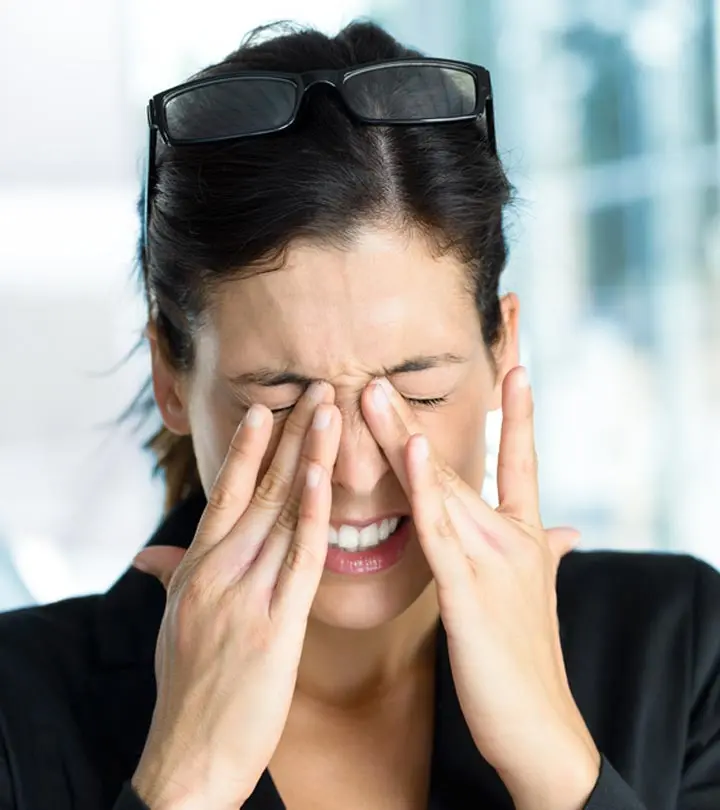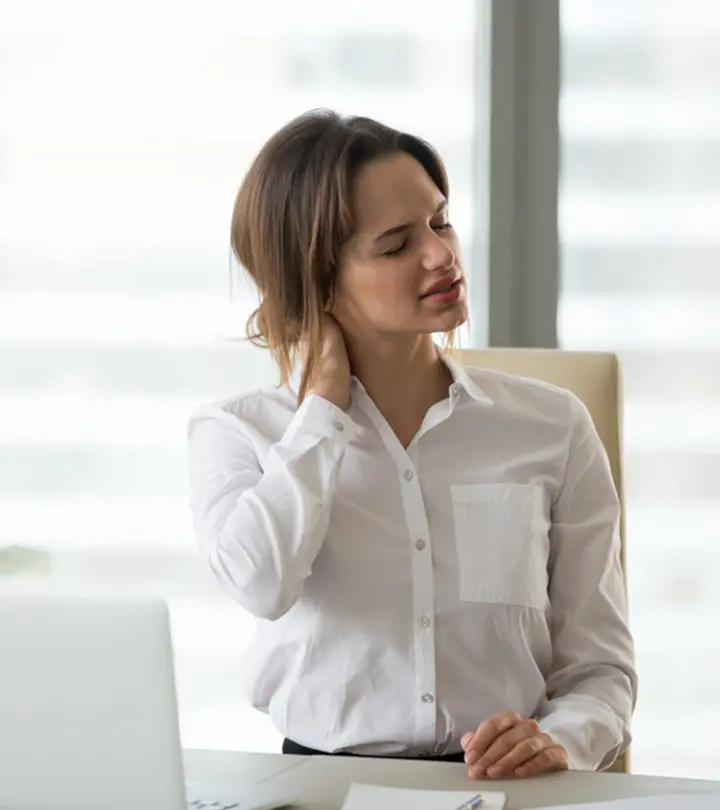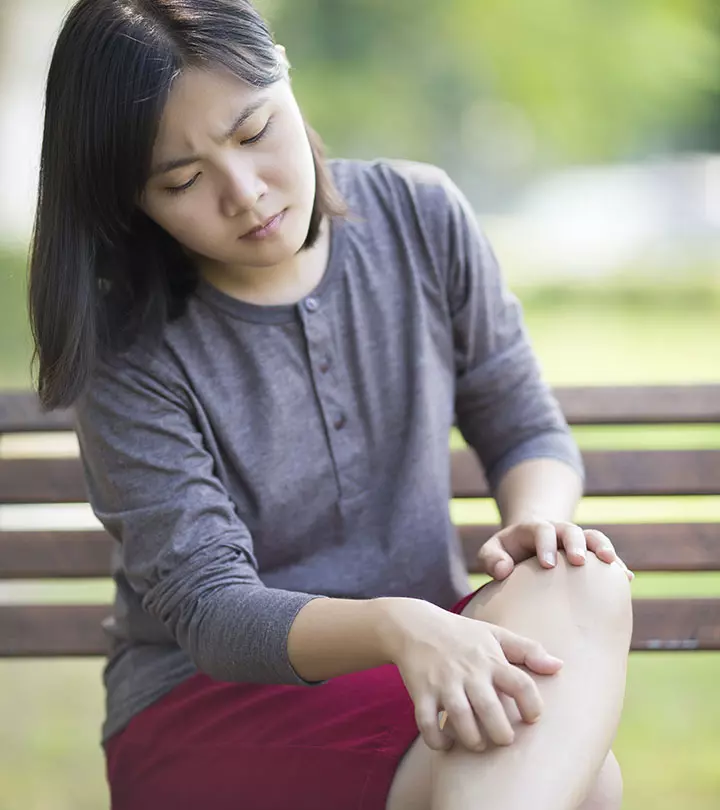Effective Remedies For A Stiff Neck | Prevention And Treatment
Our go-to solutions to ease and prevent those annoying and painful neck cricks.

Image: Shutterstock
A bad posture while sitting, standing, or sleeping may cause neck pain and stiffness. Luckily, there are ways to get rid of a stiff neck and relieve neck pain and strain. These remedies are easy to follow and are quite effective in pain management and reducing soreness. Read this article to learn ways to deal with a stiff neck, tips to prevent it, and other treatment options.
In This Article
What Is A Stiff Neck?
A stiff neck is a condition when you find it difficult to move your neck and you feel as if your neck is stuck at an odd angle. It generally occurs when you wake up from sleep or after a day of stressful activity. A stiff neck can be painful, uncomfortable, make regular activities feel cumbersome, and prevent you from sleeping well.
A stiff neck can be caused by various reasons. Some of the most common reasons for a stiff neck are activities like looking down into your monitor or smartphone or driving for long hours.
Some of the other reasons are:
- muscle sprain
- sleeping in an awkward position
- bad posture like slouching
- injuries caused while playing sports or during a workout
Research suggests that certain mental health issues like depression and anxiety may also be factors behind neck pain (1).
Let us look at some of the ways in which you can treat your stiff neck and get rid of the accumulated tension.
Key Takeaways
- A stiff neck can be painful, but it is not due to any underlying disease.
- You can get rid of discomfort in your neck with some easy-to-follow and effective remedies.
- Get a neck massage and use hot and cold therapies to help reduce soreness and relieve neck pain.
- However, you should consult a doctor when the pain radiates to your arms and legs.
Treatments For Getting Rid Of A Stiff Neck
In most cases, medical assistance for a stiff neck is not required. It can be treated at home by doing the following:
- Maintain Proper Posture
Most causes of a stiff neck are from sustained poor postures over time. Keeping your head centered over your shoulders rather than sitting or standing with a “forward head” can greatly reduce neck stiffness.
- Take Frequent Breaks
Prolonged stationary positions can lead to the development of “knots” or “trigger points” in your neck muscles. Take breaks to move and stretch regularly especially when you are working at a desk.
- Take Rest
Studies show that rest is important for muscle recovery as it helps in the healing process (2). The best thing for you to do when you have a stiff neck is to rest and avoid strenuous activities.
- Use Heat And Cold Therapy
Studies suggest that hot and cold therapy helps in reducing inflammation and may help reduce muscle soreness (3). Heat helps dilate your blood vessels and increases circulation to your neck muscles to relieve stiffness. You can apply an ice pack or place a hot water bag on the neck to relieve some of the pain caused by the stiffness.
- Take Over The Counter Medications
Non-steroidal anti-inflammatory drugs like ibuprofen and naproxen are commonly taken to relieve the pain caused by a stiff neck. There is some evidence to support their efficacy, but further studies are required to establish how effective and safe they are (4). Before you self-medicate, check with your doctor if it is okay to take any of the aforementioned medications.
Prevention is always better than cure, they say. Let us look at a few tips that can help prevent you from getting a stiff neck.
Tips To Prevent A Stiff Neck
Getting rid of a stiff neck in most cases is quite easy. It involves making some simple lifestyle and postural changes. Also, working out regularly can help strengthen your neck muscles and make them less prone to stiffness. A study suggests that including strength training exercises in your workout may help in reducing neck pain (5).
Some of the changes you can incorporate to help treat a stick neck are.
1. Use Ergonomic Furniture
Most of you work for long hours in front of a computer or laptop screen throughout the week. You tend to slouch while working or may use inappropriate furniture when working that may compromise your posture. This can be fixed by using ergonomic chairs.
There are a few tips that may help you maintain a better posture while working and may also help prevent a stiff neck.
- Adjust your chair in such a way that you can place your feet flat on the floor and your knees are below your hip level.
- Sit with your back straight and keep your arms at the same level as the desk.
- If possible use a keyboard and mouse that have ergonomic features.
- Adjust your monitor’s height to view it at eye level.
- Take a small walk and stretch a bit every hour or so.
2. Reduce Spending Time On Your Smartphone
Constantly looking down on your phone can cause your neck muscles to feel strained and fatigued. Studies suggest that excessive use of smartphones can increase the chances of neck pain (6).
In a survey of 5,719 US adults, people shared how long they think they could go without using their smartphones. The results show that 29% believe they can only last a few hours, 18% for a full day, and 16% for a few days. A smaller percentage, 7%, feel they could go a week without their smartphones, while 5% could go a few weeks or at least a month but less than a year.
These findings highlight the varying degrees of dependence and the long hours humans spend on phones.
It may be difficult to completely do away with your smartphone. These simple tips may help reduce some of the stress on your neck when using a smartphone:
- View your phone at eye level.
- Avoid wedging your smartphone between your ear and shoulder to take calls for long hours. Use wired or wireless headphones to take calls.
 Quick Tip
Quick Tip3. Take Breaks If Driving For Long Hours
Going on long drives and road trips is fun but at the same time, stressful on the neck. If you spend too much time driving and tend to get a stiff neck afterward, these tips may help prevent it:
- Take frequent breaks to stand and stretch.
- Consciously keep a check on your posture while driving.
- Adjust your seat to be in a comfortable position and ensure that it gives you a good view of the road.
- Switch with a friend or partner if possible.
4. Practice Neck Stretching Exercises
Another easy way to prevent a stiff neck is by regularly performing a few simple stretching exercises. Try these basic stretches that may help prevent a stiff neck:
- Place your fingertips below your chin and gently push your neck up for the upward stretch. For the downward stretch, interlock your fingers place them on the back of your head, and gently push down.
- Sit in an upright posture with your head over your shoulders. Gently lower your chin as if nodding your head. Hold this chin-tucked position for 10 seconds or longer and release. Repeat several times throughout the day.
- Slowly turn your head left and right, only going as far as you can comfortably.
5. Change Your Sleeping Position And Habits
Your sleeping position can have an impact on your neck and may cause a stiff neck if you sleep awkwardly. Follow these simple tips to avoid a stiff neck:
- Sleep either on your back or sides rather than on your stomach. By sleeping on your stomach you put too much pressure on your neck (7).
- Use feather pillows or memory foam pillows as these will adjust to take the shape of your neck.
- Avoid using pillows that are too high or hard.
 Quick Tip
Quick TipIn the next section, let us look at a few home remedies that you can use to help with your stiff neck.
Effective Remedies For A Stiff Neck
If you experience a stiff neck at your home, office, or gym, here are a few remedies that can help alleviate the pain.
- Get A Neck Massage
Have someone massage your neck to help relieve the pain. Make sure the pressure is gentle and not too intense. If the massage feels uncomfortable or painful, ask to stop it immediately.
- Avoid Extreme Ranges Of Motion
Avoid rapid movement with your neck, instead, gently turn your neck side to side to loosen some of the tension. You can also gently rock your head up and down as well.
- Use A Neck Collar
Use a neck collar to keep your neck upright and relieve some of the pain. Try not to use the collar for a prolonged period of time. However, it’s important to use a neck collar under the guidance of a healthcare professional.
When To See A Doctor
If the pain caused by the stiff neck is hindering your everyday activities, it’s advisable to call your physician. Some other situations where you may need medical assistance include:
- You experience stiffness and pain in the neck after an injury or vehicular collision.
- The pain caused by a stiff neck radiates to your arms and legs.
- You experience weakness in your arms and legs.
These signs could suggest some underlying medical issues, so it’s best to get yourself checked.
Stiff necks are common in people with sedentary lifestyles or poor posture. While it is a discomforting condition, it most often resolves by itself in a few days – though it may hinder your daily activities. You can speed up the healing process by limiting your movements, using a cold and hot compress, or taking OTC pain relievers. In addition, it is recommended that you correct your posture while sitting or sleeping and follow simple neck stretching exercises to prevent neck pain in the future. However, if the condition persists, consult your healthcare provider to diagnose any underlying medical condition.
Frequently Asked Questions
Can a virus cause a stiff neck?
Yes. Anecdotal evidence suggests that the common cold or flu virus can cause neck muscle stiffness. In serious cases, meningitis caused due to HSV-2 or Epstein-Barr viral infection may lead to a stiff neck.
Why is a stiff neck so painful?
A stiff neck arises when the neck muscles are overstretched or strained. The pain arises from your body clenching itself to prevent any strain on muscles or nerve damage.
How long does a stiff neck last?
The duration of a stiff neck varies based on its cause. Generally, mild cases caused by muscle strain or tension may resolve within a few days to a week with rest, gentle stretching, and over-the-counter pain relievers. However, more severe conditions like cervical arthritis or injuries may lead to prolonged stiffness, requiring medical attention and potentially lasting several weeks or longer.
When is a stiff neck serious?
A stiff neck can indicate various conditions, but it might be serious if accompanied by severe pain, fever, headache, numbness or weakness, difficulty swallowing or breathing, or if it follows a recent injury or accident. These additional symptoms might suggest more severe issues such as meningitis, spinal cord injury, or other underlying conditions requiring immediate medical attention.
Learn the benefits of physical therapy to gain relief from a stiff neck, from the video below. Understand effective techniques and exercises and how to do them properly to relieve tension and improve mobility. Click play find out more.
References
Articles on StyleCraze are backed by verified information from peer-reviewed and academic research papers, reputed organizations, research institutions, and medical associations to ensure accuracy and relevance. Read our editorial policy to learn more.
- Chronic Neck Pain And Anxiety-Depression: Prevalence And Associated Risk Factors
https://www.researchgate.net/publication/303595548_Chronic_neck_pain_and_anxiety-depression_Prevalence_and_associated_risk_factors - Rest
https://www.ncbi.nlm.nih.gov/labs/pmc/articles/PMC5342845/ - Heat And Cold Therapy Reduce Pain In Patients With Delayed Onset Muscle Soreness: A Systematic Review And Meta-Analysis Of 32 Randomized Controlled Trials
https://pubmed.ncbi.nlm.nih.gov/33493991/ - Are non-steroidal anti-inflammatory drugs effective for the management of neck pain and associated disorders whiplash-associated disorders or non-specific low back pain? A systematic review of systematic reviews by the Ontario Protocol for Traffic Injury Management (OPTIMa) Collaboration
https://www.researchgate.net/publication/274399603_Are_non-steroidal_anti-inflammatory_drugs_effective_for_the_management_of_neck_pain_and_associated_disorders_whiplash-associated_disorders_or_non-specific_low_back_pain_A_systematic_review_of_systemat - Effectiveness Of Exercise In-Office Workers With Neck Pain: A Systematic Review And Meta-Analysis
https://www.ncbi.nlm.nih.gov/labs/pmc/articles/PMC6093121/ - Neck Pain Associated With Smartphone Overuse: Cross-Sectional Report Of A Cohort Study Among Office Workers
https://pubmed.ncbi.nlm.nih.gov/33108531/ - Say “Good Night” To Neck Pain
https://www.health.harvard.edu/pain/say-good-night-to-neck-pain
Read full bio of Dr. Dave Candy
Read full bio of Sanchari Bhattacharya
Read full bio of Arshiya Syeda
Read full bio of Dipti Sharma




























Community Experiences
Join the conversation and become a part of our empowering community! Share your stories, experiences, and insights to connect with other beauty, lifestyle, and health enthusiasts.